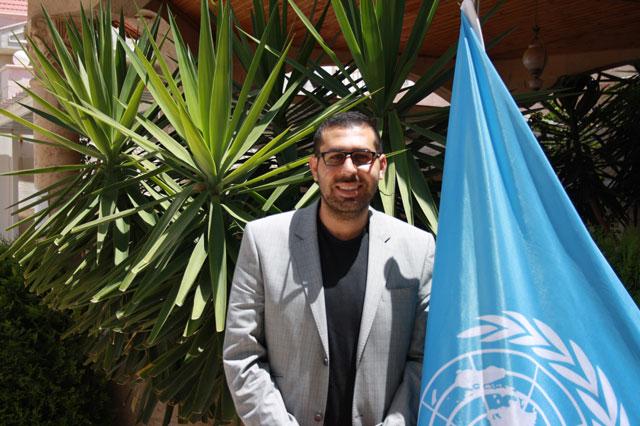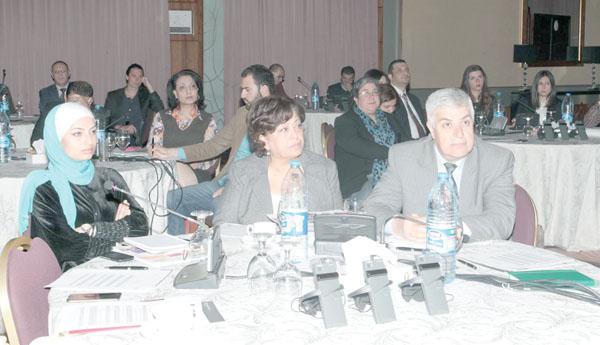You are here
Social entrepreneurship from Irbid to New York
Oct 22,2014 - Last updated at Oct 22,2014

Twenty-six-year-old Saeed Mohammad has a bright future ahead of him. Born into a family of seven children in Jordan’s Irbid camp, Mohammad’s father owns a small cheese factory in the area.
As a self-starter, he has always been more interested in working in the realm of youth, volunteerism and education.
In April, 2012, he started “Irbid Youth Volunteers” as a registered nonprofit designed to stimulate the culture of volunteering in the northern city.
Mohammad strongly believes, “if you want to change your community, you have to change yourself first.”
A self-titled, “social entrepreneur”, Mohammad is brimming with excitement as he explains how he attracts young leaders, encourages them to come up with an issue they want to tackle and spends a year actively guiding these teams to find solutions to improve upon the identified areas of concern.
He exudes a keen intelligence and passion for volunteering, but admits there have been roadblocks along his journey, with some friends and family urging him to get a “real” job.
Mohammad insists, “working on yourself and your community is more important than making money” and he feels concerned about the vast number of talented people who choose to leave their communities.
This so-called “brain-drain” encourages him even more strongly to give back locally and inspire other young leaders to increase their civic engagement and expand their interests beyond their studies.
In 2000, eight Millennium Development Goals (MDGs) were endorsed as a common framework of shared priorities of all UN Member states. The Post-2015 development agenda is the strategic development agenda that will guide the efforts of the international community after the MDGs come to an end.
This time around, using a participatory approach, the UN is facilitating at the global level an inclusive dialogue on Post-2015 possible priority areas with its member states, as well as all stakeholders, to shape the future development framework.
In 2013, Mohammad actively participated in the Post-2015 national consultations.
This year, after Jordan was selected as one of seven countries in the world to support the second phase of Post-2015 consultations under the theme “partnership with civil society and other actors”, he was eager to engage again.
In July 2014, Mohammad assisted UNESCO Amman in carrying out focus groups consultations designed to gather insights and recommendations from local stakeholders.
He will be pivotal in encouraging civil society and NGOs to connect and discuss the critical role of youth as key actors shaping resilient communities and a peaceful future.
UNESCO is committed to ensuring that young women and men are engaged in policies and programmes affecting them and leading action to promote peace and sustainable development in their countries and communities.
Supporting innovators like Mohammad is in line with UNESCO’s Operational Strategy on Youth (2014-2021) with a key focus on civic engagement, democratic participation and social innovation. In early June, 2014, with generous funding from the European Union, a new youth-focused project began with the engagement of the UNESCO Amman office.
The “Networks of Mediterranean Youth” project is an innovative intersectoral response aimed at improving the access and effective participation of young men and women in developing and implementing national strategies and policies affecting them.
In June, UNESCO’s Amman Office sponsored Mohammad to participate in the UN Economic and Social Council (ECOSOC) Youth Forum, held at the UN Secretariat in New York.
UN Secretary General Ban Ki-moon welcomed the more than 1,000 youth organisers, delegates and representatives, opening the session with words that spoke to Mohammad: “There is a world of need out there, but also a world of opportunity. So I urge you to keep doing your part. Keep showing your leadership as global citizens.”
Aimed at including and encouraging young voices in addressing the challenges of attaining the MDGs and shaping the post-2015 development agenda, Mohammad declared that he felt, “empowered by the time spent at the forum and inspired to continue to work for the youth in my community”.
His remarkable journey is just beginning; he is a strong catalyst for youth engagement and a true community champion who is sure to inspire many more.
The UN office in Amman contributed this article to The Jordan Times on the occasion of UN Day.
Related Articles
AMMAN — Young people play a crucial role in the shaping and implementation of the UN Post-2015 Development Agenda, experts and activists sai
A UN official on Monday urged local civil society organisations and young Jordanians to participate in designing and implementing the UN Post-2015 Development Agenda.
The Office of the UN Resident and Humanitarian Coordinator in Jordan and Irbid Youth Volunteers (IYV) have carried out a pilot project to support local civil society actors to achieve the future they want, by strengthening their capacities to address development challenges that affect them, according to a UN statement released on Sunday.


















